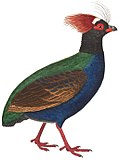Palaeortyx
Jump to navigation
Jump to search
| Palaeortyx Temporal range: Middle Oligocene to Early Pleistocene
| |
|---|---|

| |
| Palaeortyx fossil at Musee d'Histoire Naturelle, Paris | |
| Scientific classification | |
| Domain: | Eukaryota |
| Kingdom: | Animalia |
| Phylum: | Chordata |
| Class: | Aves |
| Order: | Galliformes |
| Family: | Phasianidae |
| Genus: | †Palaeortyx Milne-Edwards, 1869 |
| Species | |
| |

Palaeortyx is an extinct genus of granivorous[1] galliform bird that lived 28.4 to 2.588 million years ago.[2] It lived from the early Eocene to the early Pliocene, and may be a phasianid or odontophorid. It is known from several fossils found in Germany, France,[3][4] Italy,[5] Hungary and Romania.[6][7][8][2]
References
- ^ "Palaeortyx Milne-Edwards 1869 (pheasant)". Fossilworks. Retrieved 17 December 2021.
- ^ a b Mayr, G. et al. (2006) "A nearly complete skeleton of the fossil galliform bird Palaeortyx from the late Oligocene of Germany". Acta Ornithologica, 41(2):129–135. doi:10.3161/000164506780143852
- ^ Mourer-Chauviré, C. (1992) "The Galliformes (Aves) of Phosphorites Du Quercy (France): Systematics and Biostratigraphy". Natur. Hist. Mus. Los Angeles County. Sci. Ser., 36:37–95.
- ^ Göhlich, U. B. & Mourer-Chauviré, C. (2005) "Revision of the phasianids (aves: galliformes) from the Lower Miocene of Saint-Gérand-le-Puy (Allier, France)". Palaeontology, 48:1331–1350.
- ^ Göhlich, U. B. & Pavia, M. (2008) "A New Species of Palaeortyx (Aves: Galliformes: Phasianidae) from the Neo-gene of Gargano, Italy". Oryctos, 7:95–10.
- ^ Villalta, J. F. (1963) "Las aves fósiles del Mioceno español". Bol. Roy. Soc. Esp. Hist. Natur. Madrid, 61(2):263–285.
- ^ Jánossy, D. (1976) "Plio-Pleistocene Bird Remains from the Carpathian Basin: I. Galliformes: 2. Phasianidae". Aquila, 83(1):29–42.
- ^ Jánossy, D. (1993) "Bird Remains from the Upper Miocene (MN 9) of Rudabanya (N-Hungary)". Aquila 100(1):53–70.



